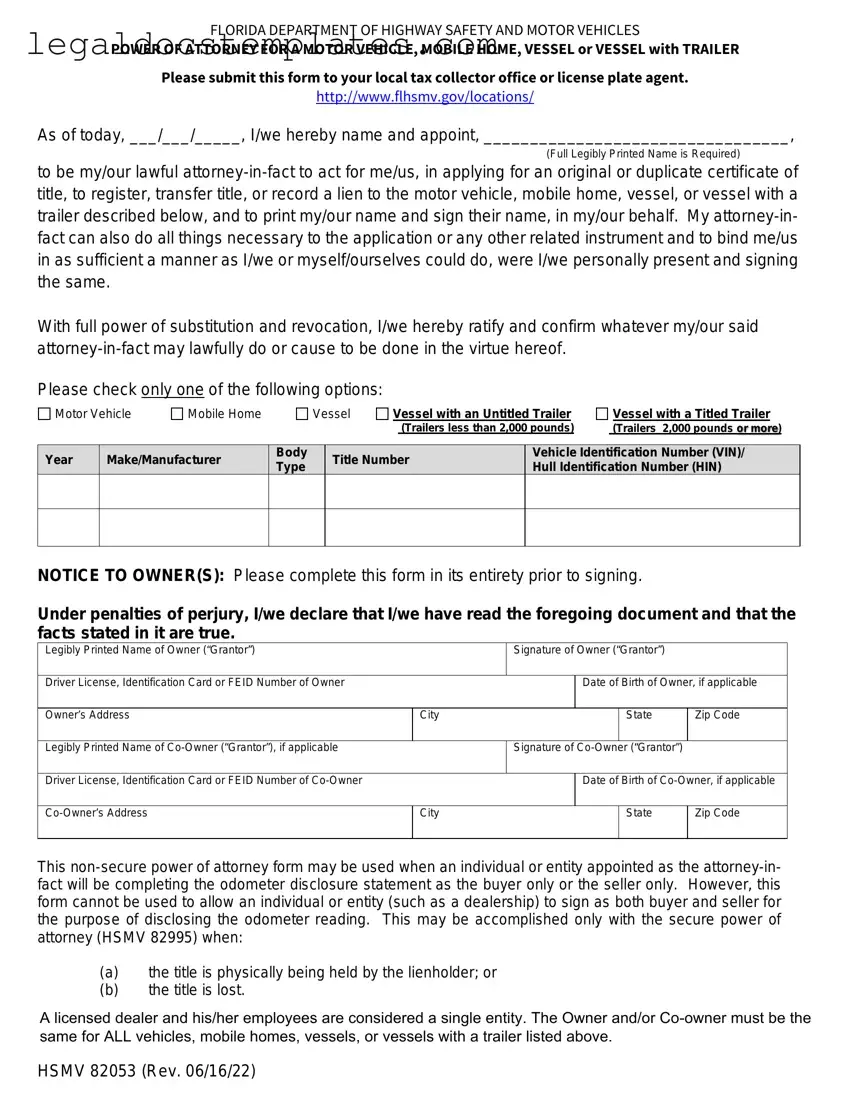The Florida Vehicle Power of Attorney (POA) Form 82053 is a specialized document allowing a person to grant another individual the authority to make decisions regarding their vehicle on their behalf. This type of document is not unique, as there are many other forms that serve a similar purpose in different contexts. Understanding these documents can illuminate the importance of delegated decision-making in various aspects of life and law.
A General Power of Attorney form mirrors the Florida Vehicle POA in that it grants broad authority to another person to make decisions on the grantor's behalf. However, unlike the vehicle-specific POA, a General Power of Attorney is not limited to one aspect, such as a vehicle, but covers a wide range of legal and financial decisions. The principal difference lies in the scope of authority granted, highlighting the need for specificity in legal documents.
A Medical Power of Attorney is another example, designed to allow someone to make health care decisions for another. Similar to the vehicle POA, it activates under specified conditions, such as the grantor's incapacity. The critical distinction is in the nature of decisions being made: one is tailored towards health care decisions, while the other is focused on vehicle-related matters. This demonstrates the legal system's flexibility in accommodating various needs through tailored documents.
A Durable Power of Attorney shares the feature of empowering another individual with decision-making capacity. It is unique because it remains effective even if the grantor becomes incapacitated. This is similar to the Vehicle POA’s function of delegating authority but is distinct in its enduring applicability, underscoring the importance of planning for unforeseen circumstances in legal preparations.
The Limited Power of Attorney form is designed for one-time or specific transactions. Like the Florida Vehicle POA, it restricts the agent’s power to particular situations or tasks. This document’s parallels highlight the legal principle of limited delegation, ensuring that power is granted narrowly and for specific purposes to prevent abuse.
A Real Estate Power of Attorney allows someone to manage another's real estate matters, from buying to selling property. Although it concerns real estate rather than vehicles, the core principle of entrusting someone with significant authority over personal affairs remains. This similarity reveals the widespread applicability of power of attorney documents across various property types.
The Financial Power of Attorney, tasked with overseeing the financial affairs of the grantor, parallels the vehicle POA in empowering an agent to make decisions and perform actions in a defined area—finances in this case. This resemblance underlines the necessity of trust and careful selection of an agent in power of attorney arrangements.
A Child Care Power of Attorney grants temporary authority to an individual to make decisions regarding a child's welfare in the parent's absence. Though it pivots away from property or financial matters, it shares the fundamental nature of delegated authority seen in the Florida Vehicle POA. The contrast in focus underscores the document's adaptability to various facets of personal affairs.
A Springing Power of Attorney is set to become effective upon the occurrence of a specific event, typically the incapacity of the principal. While this conditionality can also be applied in vehicle POA arrangements, the springing document's hallmark is its future activation based on predetermined conditions, highlighting the value of foresight in legal planning.
Last but not least, the Revocation of Power of Attorney form serves as the counterpart to all types of power of attorney, including the vehicle POA. It provides a method to withdraw the granted powers, emphasizing the grantor's continuing control over the authority they have delegated. The existence of such a document underlines the principle that powers of attorney are not only flexible but also revocable at the grantor's will.
Each of these documents shares the underlying principle of allowing one person to make decisions on another's behalf within a legal framework. While they cater to diverse needs—from healthcare to real estate, finances, and even child care—they all demonstrate the legal system's capacity to adapt to the vast array of human relationships and circumstances. The specific features of the Florida Vehicle Power of Attorney form reveal just one facet of this intricate web of delegated authority.


